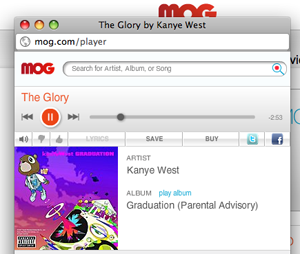We’re living in an exciting era for media. The user experience of consuming (and producing) media is changing rapidly, as new devices take hold of the consumer market. Smartphones, tablets, Internet TVs, eReaders, and more. It isn’t just new devices either. The content we’re consuming is beginning to change too. For example, it’s only natural that the type of television program you consume on a tablet device can – and increasingly will – be different to traditional television.

Today we’re starting a new series on ReadWriteWeb that will explore how the user experience (UX) of media is evolving. Over the coming weeks we’ll look at television, movies, music, books, blogs, news, art – anything that is ‘content’ on the Web. In today’s post, we’re going to explore the new UX of music on smartphones.
I better start by explaining what I mean by “user experience.” It’s a web design term, but I’m using it in a broader sense to mean the experience of using a product. Wikipedia defines user experience as “how a person feels about using a product, system or service.” It goes on to state:
“User experience is subjective in nature, because it is about an individual’s feelings and thoughts about the system. User experience is dynamic, because it changes over time as the circumstances change.”
Online music has had a particularly fruitful couple of years in terms of innovation. As I explained in January, new subscription-based music services like MOG, Rdio and Spotify have shaken up the online music market with their all-you-can-eat plans and compelling mobile apps. Meanwhile other services, such as online music stalwart Pandora, continue to add new features and expand into new markets.

More Control Over The Songs You Play
Perhaps the biggest change in the user experience of online music over the past few years is that you can now control what you listen to.
With last.fm and Pandora, leaders in the previous wave of online music, you had limited control over what songs would play. Those apps were modeled on radio, where you don’t know what song is coming next. With the new wave – MOG, Rdio and Spotify – you can listen to entire albums.
What’s more, you don’t need to own the albums. You can subscribe to one of those services for as little as $5 per month and listen to an impressive catalog of new and old music. Today I listened to the brand new Strokes album on MOG, even though I don’t own it.
Being able to choose what I listen to and explore new music without having to buy it first, is very liberating to a music fan such as myself.
Slicker Mobile Apps & Enhanced Discoverability
The other major change in recent years is the vast improvement in functionality of mobile music applications. It almost goes without saying that MOG, Rdio and Spotify all have outstanding mobile apps. But let’s look at another mobile music app that not only has a wonderful UX, but enables you to discover even more new music: Shazam. It’s an app that can identify the name of a song, no matter where you hear it. For example, if you hear a song in a shop – simply launch Shazam on your phone and it identifies the music.

We’ve been raving about Shazam for years at ReadWriteWeb, but even over the past 6 months the service has taken itself to a new level. In September, Shazam launched improved music discovery features along with a fresh user interface for its iPhone and iPod touch apps. Then in January, Shazam added a new option for interacting with a song it’s identified: listen in Spotify. As Marshall Kirkpatrick noted at the time:
“A seamless ability to listen to entire albums of whatever musician or group is playing on the speakers in a room you’re in, with just a click or two and some awesome music identification technology, is truly incredible.”
My UX: Music on Mobile is a Pleasure!
The increased control over what music we listen to, together with enhanced discoverability of new music, are two of the main user experience trends in music on smartphones. Both of those things have significantly enhanced my music-listening pleasure. They’ve increased the range of music I listen to and have given me the opportunity to listen to music anywhere I go (although expensive bandwidth is still an issue where I live).

It’s by no means a perfect user experience yet, however. There’s still work to do on fleshing out back catalogs in music apps – the online music companies continue to work through this issue with record companies. Also, syncing your music between devices is not always hassle-free. Finally, tracking your listening habits and having that data given back to you in a usable format is not universally solved – despite the groundbreaking work of Last.fm and its Audioscrobbler.
Overall though, I’m very happy with the state of music on mobile devices! Let us know in the comments about your own user experience.
Photo credit: mari moon

















